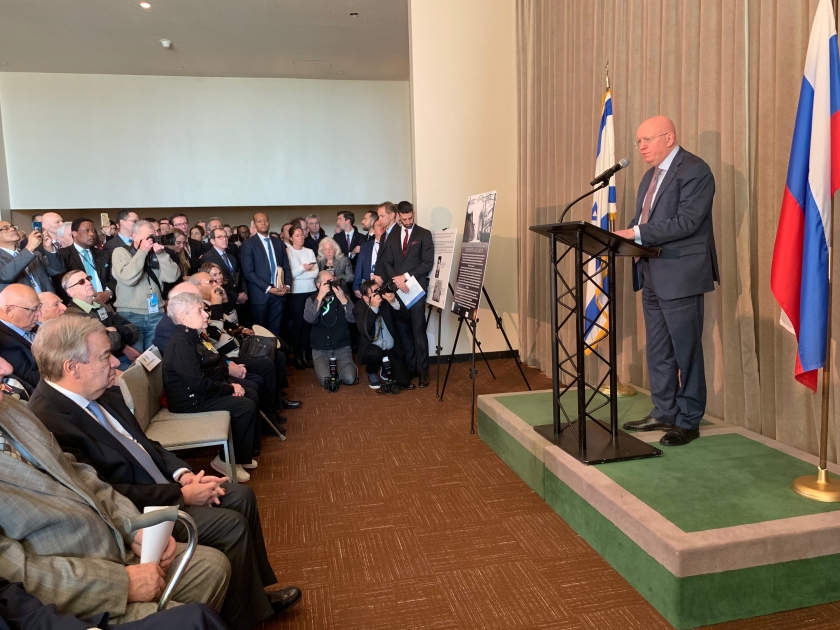Welcoming remarks at the opening of an exhibition on the occasion of the 75th anniversary of liberation of the Auschwitz-Birkenau Nazi concentration camp
Secretary-General, Excellencies, Ladies and Gentlemen, dear Friends,
75 years ago on 27 January 1945 the Red Army liberated the prisoners of Auschwitz, the Nazi deadliest concentration camp. The World was terrified to learn and to see the reality and the scale of Nazi’s atrocities. First of all, today we remember the survivors and the Soviet soldiers who stopped the Nazi plague by paying for this with an immense sacrifice. There are a lot of memoirs telling how deeply shocked and overwhelmed were the liberators of Auschwitz by the state of the prisoners and the inhumane conditions of their imprisonment and barbarian and sadistic methods used by their Nazi captors.
When I was young, as a school boy I visited Poland. We went on an excursion to Auschwitz death camp. Auschwitz was only one of Nazi death camps, alongside with Dachau, Treblinka, Sobibor and others. They all became macabre symbols of hate of the Nazi regime and its inhumane theories of racial superiority to which Jews, Gypsies, Slavic people and other people living in Poland, Czechoslovakia, USSR, Germany and other countries fell victims. Only in Poland alone 3 mln. Jews were methodically exterminated, more than third of them in Auschwitz.
Holocaust was masterminded and implemented by Nazi regime and concrete personalities. The Nuremberg tribunal condemned and sentenced them unequivocally. This verdict should never be questioned or doubted if we don’t want such tragic events to be repeated. Auschwitz is the place where the terrible tragedy of the past should always be a clear warning and a lesson.
Unfortunately, today rewriting history, including the history of WW2, has become a dangerous trend. Liberators and heroes are presented as aggressors and invaders. Collaborators and traitors are presented as liberators and heroes. Even the causes and chain of events that led to the beginning of WW2 is being questioned. This has no justification, no matter what could be political or geopolitical reasoning behind it.
We strongly condemn such attempts. For us it is an extremely sensitive issue as the memory of the Great Patriotic War and the Second World War is in our DNA.
Let me remind that as a result of the Second World War, twenty seven million USSR citizens died, two thirds of them were civil population. Almost every Russian family, including mine, lost one or several members at war and therefore preserves its own account of that tragic time.
We raise our voice firmly to prevent the Auschwitz-type atrocities in the future. It is important not only for the memory of those who perished, but also for the present and future generations. I would like to quote here a famous Italian writer Primo Levi, an Auschwitz survivor liberated by the Red Army: ”Monsters exist, but they are too few in number to be really dangerous. More dangerous are the common men, the functionaries, ready to believe and to act without asking questions.”
Today we say “Never Again!” and call all the others to join us for the sake of future generations that need to be aware of the truth about Holocaust and its perpetrators, no matter how disgusting and uncomfortable it may seem.
In two days Russian President Vladimir Putin together with Prime-Minister of Israel Benyamin Netanyahu and a number of world leaders will take part in commemoration of the 75th anniversary of the liberation of Auschwitz and Holocaust remembrance events in Israel. This reflects importance that we attach to the memory of what happened three thirds of a century ago.
Archive documents from the collection of the Victory Museum (Russia) that we display today feature how the Auschwitz-Birkenau was created and functioned revealing who was imprisoned as well as what it was like to live and die in a concentration camp. A stunning series of artworks by famous Soviet painter Zinoviy Tolkachev explores one of humanity’s greatest catastrophes through graphic drawings depicting Holocaust victims, their fears and faith, love and hopes. Those works belong to the Victory museum. Selected photographs are from the Lonka project (Israel). They celebrate the resilience of Holocaust survivors and their strong power to live in unlivable conditions.
Thank you.
